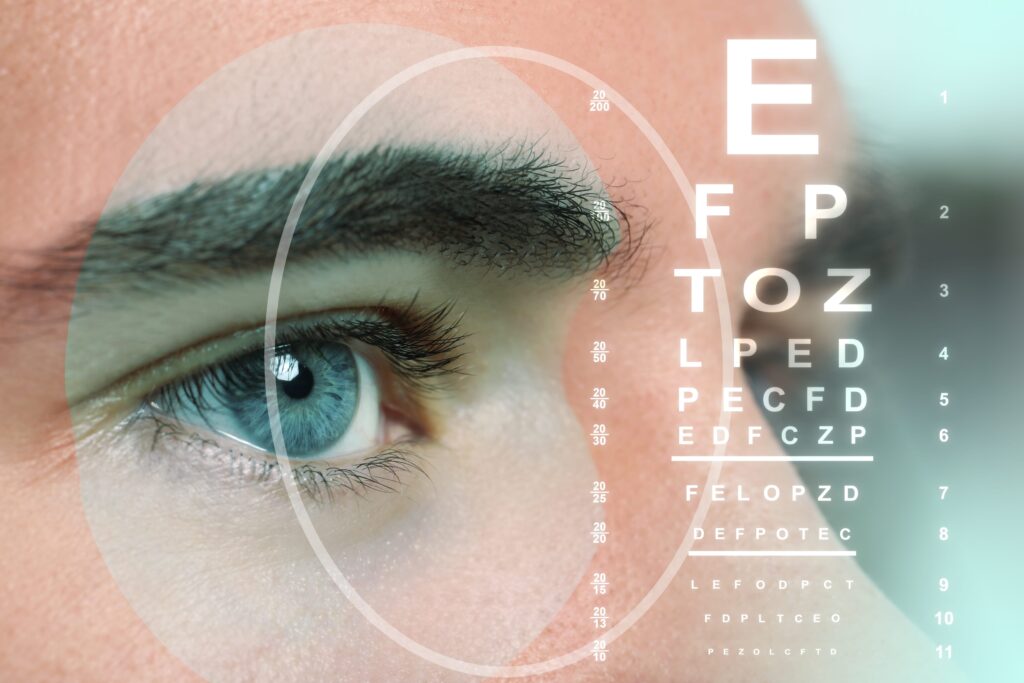

Patients exploring their options for vision correction may be debating between ICL eye surgery vs. LASIK. Implantable Collamer Lens (ICL) and laser-assisted in situ keratomileusis (LASIK) are commonly used remedies for vision loss caused by refractive errors.
This blog explores vision ICL vs. LASIK, including pros, cons, and pricing, so you’re informed about available vision correction options.
LASIK and ICL are laser vision correction procedures that treat various refractive errors. LASIK involves a laser reshaping of the cornea to improve vision, whereas an ICL procedure entails implanting an artificial lens into the eye. Both operations treat nearsightedness (myopia), farsightedness, and astigmatism.
When it comes to ICL eye surgery vs. LASIK, the main difference is how they are carried out. ICL is an intraocular procedure that implants lenses in the eyes. After the initial surgery, they can stay in the eye indefinitely without additional surgery or preservation, although they may be removed when the patient develops cataracts.
LASIK is a surgical procedure that uses lasers to reshape the eye’s cornea. After the initial surgery, periodic touch-ups may be needed to maintain the desired vision correction. Both methods are effective and safe for correcting vision errors, but choosing between them depends on individual needs and preferences.

There is some overlap between those who would be suitable candidates for LASIK and Visian ICLs and those who would benefit from either of the two vision correction treatments.
For both procedures:
Although both LASIK and ICLs have similar requirements, there are some primary distinctions between eye ICL vs. LASIK:

LASIK is a more affordable procedure with a shorter recovery period than ICL. The Visian ICL can be removed if necessary.
Let’s examine the advantages of LASIK vs. implantable contact lenses more carefully:
Lasik uses a laser to reshape the cornea, allowing light to focus correctly on the retina and improve vision. The procedure is permanent, as the laser permanently reshapes the cornea. ICL, on the other hand, is a procedure that involves implanting a lens inside the eye. The lens can be removed, making ICL a reversible method.
Both LASIK and ICL, as medical procedures are low-risk.
LASIK is a safe and efficient procedure that involves the reshaping of the cornea by using a laser to remove a thin layer of tissue. It is typically performed on an outpatient basis and only takes 10-15 minutes, with most patients noticing an improvement in their vision within 24 hours.
On the other hand, the ICL procedure usually takes around 15 minutes and is usually performed under topical anesthesia. After the procedure, the patient will be monitored for a few hours and might need to wear a protective shield at night for a few weeks.
The success rate and potential complications of both procedures depend on the overall health of the patient and the skill of the surgeon performing the procedure.
The most common complication from LASIK is dry eye, managed with eye drops, and is usually temporary. Other potential complications include infection, vision loss, halos or glare, and under- or over-correction of the vision. Complications with ICL may decrease contrast sensitivity and night vision, as well as inflammation, infection, cataract formation, and vision loss.
Overall, LASIK and ICL are safe and effective procedures for correcting vision; however, each operation carries potential risks and complications. It is essential to discuss both approaches with an experienced and qualified eye doctor, who can help you make an informed decision about which is best for you.
The recovery time for LASIK is typically shorter than for ICL. Most patients can return to normal activities (barring heavy physical tasks and working out) within 24 hours after LASIK, while it may take up to two weeks for full recovery after ICL.
Both LASIK and ICL can improve night vision. However, ICL may be more beneficial for those with severe nearsightedness since the lens is placed behind the iris, which is closer to the retina. Hence, ICL provides a sharper and clearer night vision, often with fewer haloes, distortions, and bright light sensitivity.
Unlike LASIK, ICL does not involve cutting or reshaping the cornea and instead uses a tiny lens implant to correct vision. It means that there is essentially no risk of corneal damage due to cutting or reshaping.

Common temporary side effects of both ICL and LASIK include dry eye. However, dry eye is more common after LASIK than after ICL. It is because the excimer laser used in LASIK removes more corneal tissue, which may lead to a tear film disruption.
The main difference between LASIK and ICL is that LASIK is a surface-level procedure, while ICL is an intraocular procedure. LASIK is generally considered a safe and effective procedure for correcting myopia, with most patients achieving 20/20 vision or better. Regarding implanted contacts v. LASIK, ICL is a more invasive procedure, but it is also more effective and is better for people with higher degrees of myopia.
| Basic Differences | ICL | LASIK |
|---|---|---|
| UV protection | Yes | No |
| Removes corneal tissue | No | Yes |
| Biocompatible lens | Yes | No(laser-based) |
| Reversal or removal | Yes | Not reversible |
| Recovery days | 1-2 days | 2 weeks for flap healing |
| Suitable for thin corneas | Yes | Depends |
| Contributes to dry eyes | Minimal chance | Yes |
LASIK costs vary widely depending on the type of procedure used, the clinic, and the area in which it is performed. Generally, the cost of traditional LASIK can range from $1,800 – $3,000 per eye, although financing options are available.
In terms of ICL versus LASIK cost, ICL is typically more expensive than LASIK, with the average cost ranging from $3,000 – $5,000 per eye. It is due to the more complex nature of the procedure and the materials required.
You can prepare for either procedure by doing the following:
So, is ICL better than LASIK? Not necessarily. Lasik and ICL are two very different vision correction procedures. While both can provide excellent vision results, we advise discussing your options with your eye care professional to determine which is best for you.
Our specialists at Discover Vision Centers in Kansas have successfully performed both procedures. If you schedule an online appointment, we can determine whether you need ICL or LASIK surgery.